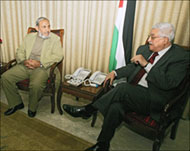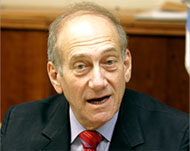Hamas officials hold talks in Cairo
Leaders of Hamas, which swept Palestinian elections last month, have held talks in Cairo with Egyptian officials on the possible inclusion of the defeated Fatah party in a new Palestinian government.

A Hamas leader had earlier said the group had asked Fatah to
join a government, but it had yet to respond.
A top Hamas official at the talks said on Monday the movement will not recognise Israel but will abide by, for now, agreements Palestinian leaders already made with Israel.
The talks in Cairo are expected to last several days.
Moussa Abu Marzouk, the right-hand man of Hamas’ political leader Khaled Mashaal, also lashed out at the more moderate Fatah party for refusing to participate in a national unity Palestinian government.
In a statement, Abu Marzouk blamed the Fatah movement for refusing to participate in a national unity government, which Hamas wants to form to avoid an Israeli veto on it.
“We will act in the legal framework to get out from this deadlock, which our brothers in Fatah have put us in,” he said.
Abu Marzouk said any government set up by Hamas “will not make security arrangements with Israeli or hand over (Palestinians) who fire rockets (on Israel)”.
He also insisted the group would not recognise Israel.
International pressure
Hamas is under growing international pressure to renounce violence and recognise Israel’s right to exist as a condition for receiving millions of dollars in foreign aid – the lifeline of the Palestinian economy.
Western powers have said they will not fund a Hamas-led Palestinian government otherwise.
Egyptian intelligence chief Omar Suleiman said last week that Egypt intends to tell Hamas leaders that they must recognise Israel, disarm and honour past peace deals.
The leaders are expected to meet later with senior Egyptian officials, including Suleiman and Ahmed Aboul Gheit, the foreign minister.
 |
|
Hamas officials have met with |
Mashaal arrived from Damascus leading a delegation from the movement’s outside while another delegation from Gaza led by Mahmoud al-Zahar arrived from the Palestinian territories.
Before the leaders started their meetings at a Cairo hotel, Abu Marzouk acknowledged that the movement faces difficulties in its attempts to set up a government.
“The most daunting task we face is to recognise the Zionist enemy and the obligations which the Authority had in the absence of similar (Israeli) obligations,” he said.
Marzouk said Hamas officials had met with Mahmoud Abbas, the Palestinian president and Fatah’s leader, and that Abbas did not insist that Hamas had to recognise Israel or make other concessions before Fatah would negotiate a deal to form the next Palestinian government.
Speaking of past peace deals between the Palestinians and Israel, Marzouk said: “There is no authority that inherits another authority without abiding by the agreements already made. But the other party also should be committed to the agreements.”
He said Hamas would review all past deals.
Israel adamant
For his part, Israel’s acting prime minister, Ehud Olmert, said on Monday he will work with Abbas as long as he does not join forces with Hamas.
Olmert also said Israel would continue transferring monthly tax payments to the Palestinian Authority as long as Hamas is not in control.
“I have no interest in harming Palestinian Authority chairman Abu Mazen as long as he doesn’t cooperate with Hamas and as long as the Palestinian government isn’t led by Hamas,” Olmert said.
 |
|
Olmert says he will only work with |
Abbas is widely known as Abu Mazen.
He spoke a day after Israel agreed on Sunday to transfer $54 million (45 million euros) in desperately needed tax money to the Palestinian Authority, but said it might freeze payments after Hamas forms the next Palestinian government.
Israel’s monthly transfer of the taxes and customs duties it collects on behalf of the Palestinians is crucial to the functioning of the Palestinian Authority.
Halting the payments would deepen the government’s financial crisis and add to the growing international pressure on Hamas to renounce violence and recognise Israel before it takes power.